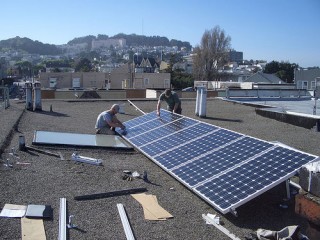 If we
can’t expect Georgia Power or Southern Company to change their tune about solar power,
what can we do?
Legislate and raise public pressure, while getting on with installing what
solar power we can.
If we
can’t expect Georgia Power or Southern Company to change their tune about solar power,
what can we do?
Legislate and raise public pressure, while getting on with installing what
solar power we can.
 Maybe it’s time to pass something like
HB 267 that would limit Georgia Power’s profits on
that 19-month-late and $1 billion over budget nuclear boondoggle at Plant Vogtle.
Instead of pouring more money down that broken concrete pit on the Savannah River,
we need something like
GA SB 51, The Georgia Cogeneration and Distributed Generation Act,
to fix
Georgia’s special solar financing problem,
the antique 1973 Territorial Electric Service Act.
That’s the 40-year-old antiquated law that SO CEO Thomas A. Fanning says
“we need to protect”.
Maybe SO does, for Fanning’s
huge raises in compensation.
Georgia Power and SO are not only defending that antique law,
they’re preventing
a Georgia Renewable Portfolio Standard (REPS) by stopping passage of bills like
HB 503.
Georgia Power, SO, and super-lobby ALEC
systematically oppose renewable energy standards.
Maybe it’s time to pass something like
HB 267 that would limit Georgia Power’s profits on
that 19-month-late and $1 billion over budget nuclear boondoggle at Plant Vogtle.
Instead of pouring more money down that broken concrete pit on the Savannah River,
we need something like
GA SB 51, The Georgia Cogeneration and Distributed Generation Act,
to fix
Georgia’s special solar financing problem,
the antique 1973 Territorial Electric Service Act.
That’s the 40-year-old antiquated law that SO CEO Thomas A. Fanning says
“we need to protect”.
Maybe SO does, for Fanning’s
huge raises in compensation.
Georgia Power and SO are not only defending that antique law,
they’re preventing
a Georgia Renewable Portfolio Standard (REPS) by stopping passage of bills like
HB 503.
Georgia Power, SO, and super-lobby ALEC
systematically oppose renewable energy standards.
 They do this so successfully there are no REPS in Southern Company (SO)’s
service territory, nor in most of SO’s surrounding
“Competitive Generation Opportunities” states.
One of the few exceptions is North Carolina, and
a bill was introduced there to eliminate NC’s REPS.
They do this so successfully there are no REPS in Southern Company (SO)’s
service territory, nor in most of SO’s surrounding
“Competitive Generation Opportunities” states.
One of the few exceptions is North Carolina, and
a bill was introduced there to eliminate NC’s REPS.
Maybe it’s even time to do something about Georgia Power’s 11% guaranteed profit. Isn’t Georgia Power supposed to be a utility operating for the good of Georgians? Why does it get a guaranteed profit to pass on to Southern Company shareholder dividends and SO executive bonuses?
 Georgia Power and even Southern Company could suddenly flip for solar power
like
Austin Energy did in 2003
and Cobb EMC did in 2012.
But that probably won’t happen without a lot of public pressure,
legal requirements by the Georgia legislature or PSC,
or a shareholder revolt.
So let’s start with
the public pressure….
Georgia Power and even Southern Company could suddenly flip for solar power
like
Austin Energy did in 2003
and Cobb EMC did in 2012.
But that probably won’t happen without a lot of public pressure,
legal requirements by the Georgia legislature or PSC,
or a shareholder revolt.
So let’s start with
the public pressure….
-jsq










